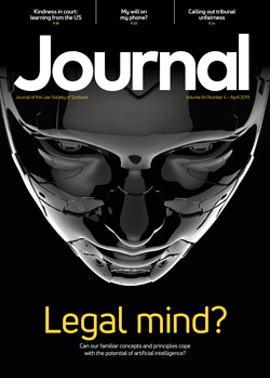Book reviews
Lord Hope's Diaries: House of Lords 1996-2009
PUBLISHER: AVIZANDUM
ISBN: 978-1904968962
£25
This is the fourth instalment of Lord Hope's diaries and sees the transition of the Lords of Appeal (the Law Lords) to the Supreme Court, across Parliament Square in Middlesex Guildhall.
The entries offer an insight across a range of issues and concerns. Take, for example, 29 September 2004. Hope, on serving 15 years as a judge, including Lord President, writes: “I feel somewhat despondent as I look back on my judicial record. Have I achieved anything? 'Not much,' seems to be the answer.” He concludes: “Perhaps I should just soldier on, a foot soldier among the team of Führers above and below me, trying my best not to get into trouble or to let anyone down.”
In the same day, he worries about the possibility of the new Supreme Court being housed in the less atmospheric New Wing of Somerset House, the loss of free car parking at Edinburgh airport and disarray in his previously “well oiled” travel plans as he commutes between London and Edinburgh. Delightful candour.
One only however has to look at the index of cases (and of course, read Hope's diary entries on those which fall within this period) to recognise that his contribution is immense. From a wide range of cases, of particular interest both by the publicity they generated then and the impact of the decisions now, are those of Pinochet (immunity from prosecution) and Gentle (death in combat). In the former, Hope provides insight into the convergent views of the seven judges on whether General Pinochet should be immune from prosecution. Hope received widespread praise for his judgment, in which he analysed the charges the general faced. The decision was 6:1 against Pinochet.
Gentle considered whether a breach of ECHR, article 2 had occurred following the death in combat of a soldier. The court unanimously and swiftly rejected the application by the soldier's mother. The Government (in various offices) was represented by Jonathan Sumption QC, who was subequently appointed direct to the Supreme Court bench from the bar.
Hope provides insight to the appointments of senior members of the judiciary, offering his own own views on merit, whether the appointment of Lord Hamilton or Lord Gill as Lord President or the Northern Ireland position on the Supreme Court bench.
He is candid in his views on colleagues, those who appeared before him (he describes the vast amount of paper and authorities lodged by counsel in one particular case, from which all practitioners might pay heed, as he did not read all the authorities) and a solicitor advocate appearance.
Into this rich mix, Lord Hope reflects on much, passing observations on the Scottish Parliament (then in its youth) and also his humility at the vast range of experiences to which he is exposed, from the Royal Garden Party to Vad Yasem in Israel.
While he recognises the merit on which Dame Eilish Angiolini and Frank (now Lord) Mulholland were appointed Lord Advocate and Solicitor General in May 2007, he does observe: “it is clear these offices no longer have the pulling power they did as progress to the Court of Session bench is, in practice, denied to them... the traditional standing of the Law Officers as lawyers of outstanding quality must suffer in consequence”.
That perhaps demonstrates the openness and candour for which this series of diaries has become noted.
In this issue
- Time to promote shared care?
- Client medical records: a matter of right
- Search for the route to healing
- Rights after “same roof”
- Are you a qualified creditor?
- Reading for pleasure
- Opinion: Allan Jamieson
- Book reviews
- Profile: John Laughland
- President's column
- ScotLIS update
- People on the move
- Common law and artificial life
- FAIs: addressing the concerns
- Challenging times
- Shared humanity
- Cases of the paperless will
- How to manage your legal practice for success
- Fairness v Convenience
- Moorov then and now
- Personal licences: the uncertainty continues
- Is Airbnb use a planning matter?
- Insolvency Rules: a positive realignment
- IR35 compliance moves up the ladder
- “Best interests” in the balance
- Scottish Solicitors' Discipline Tribunal
- PSG tackles index-linked rent reviews
- Finding the right seat
- Public policy highlights
- Accredited paralegal update
- Events, and more, for members
- Accredited Paralegal Committee profile
- Second thoughts on executor declarations
- Client communication – a continuous journey
- Reflections from the Commission
- Love my tender
- Ask Ash






